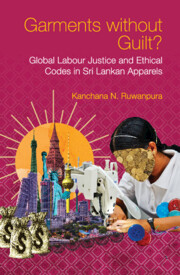Book contents
- Frontmatter
- Dedication
- Epigraph
- Contents
- List of Tables, Figures and Images
- Preface and Acknowledgements
- Published Works and Funding
- List of Abbreviations
- 1 Introduction: Global Labour Justice via Ethical Codes?
- 2 Labouring for Apparels: Labour Geographies and Feminist Inflections
- 3 Fieldwork: Prolonged Phases and Multiple Moments
- 4 Clothing the World – Guilt Free? Sri Lanka’s Apparel Landscape
- 5 Neglected Labour Histories: The Sri Lankan State Responds to Labour
- 6 Ethicality with a Blind Eye? Ethical Code Practices at Production Sites
- 7 From War to Work: Ethicality amidst Post-War Trauma?
- 8 Concluding Thoughts: Grounded Governance?
- Appendix
- References
- Index
Preface and Acknowledgements
Published online by Cambridge University Press: 15 December 2021
- Frontmatter
- Dedication
- Epigraph
- Contents
- List of Tables, Figures and Images
- Preface and Acknowledgements
- Published Works and Funding
- List of Abbreviations
- 1 Introduction: Global Labour Justice via Ethical Codes?
- 2 Labouring for Apparels: Labour Geographies and Feminist Inflections
- 3 Fieldwork: Prolonged Phases and Multiple Moments
- 4 Clothing the World – Guilt Free? Sri Lanka’s Apparel Landscape
- 5 Neglected Labour Histories: The Sri Lankan State Responds to Labour
- 6 Ethicality with a Blind Eye? Ethical Code Practices at Production Sites
- 7 From War to Work: Ethicality amidst Post-War Trauma?
- 8 Concluding Thoughts: Grounded Governance?
- Appendix
- References
- Index
Summary
On a crisp, beautiful autumnal morning in 2007, I attended my first away-day in British academia. Quite a few of us in Southampton's School of Geography, had made the transition from North America to a British university. We were Cool Britannia then, and we all felt novelty, excitement and dread in equal measure. Little did I know the collective energy I enjoyed on that first day would generate a humbling journey that has culminated in the pages of this book.
That morning, I was treated to a presentation by one of my senior colleagues, Neil Wrigley, about his work with Alex Hughes and Martin Buttle, on multi-stakeholder initiatives and ethical trading. As I sat listening, a nagging question began rattling around my brain. During the question and answer, I first voiced it: ‘What about the workers? What do they think of these ethical trading initiatives? Where is their voice?’ I don't recall any discussion, but later, during lunch, Neil and another senior colleague, Peter Sunley, followed up and gave encouragement to this newly formed idea: ‘That was an important perspective you flagged; there is something there, you should explore it.’ Soon I secured an ESRC (Economic and Social Research Council) grant (061-25-0181), which allowed me to launch this project, where I explore these questions in the context of the Sri Lankan apparel sector.
My question had its roots in work I had done before coming into academia. My time at the International Labour Office (ILO) in Geneva, Switzerland, introduced me to senior colleagues who valued ILO's tripartite spirit: Manuela (Tomei), Auret (van Heerden), Naoko (Otobe), David (Kucera), Clare (Harasty) and Azita (Berar-Awad). The many projects I did there instilled in me the need to pay attention to workers’ voices and their quest for justice.
Primed to ask questions, I arrived in Sri Lanka where the generous, committed, feisty garment workers taught me what I needed to know to tell this story and answer the questions I posed on that away-day many years ago. And those workers, in turn, taught me the value of listening.
I brought these tenets to my research and analysis on the apparel sector of Sri Lanka.
- Type
- Chapter
- Information
- Garments without Guilt?Global Labour Justice and Ethical Codes in Sri Lankan Apparels, pp. xv - xxiiPublisher: Cambridge University PressPrint publication year: 2022



